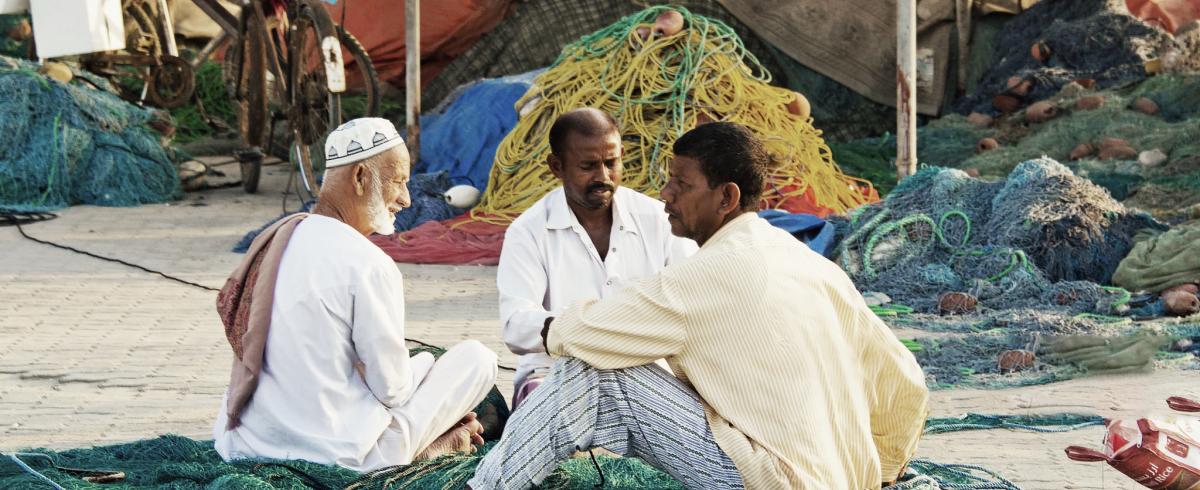
Categories to Explore
Welcome to the Resource Library. Here you will find a range of resources that you can use to support your small-scale fishery and community. Use the buttons above to browse resources by category or use the filters on the right to sort resources.
Introducing Storied Fish
"Storied Fish" is seafood that comes with verifiable information about its journey from water to plate. We explain what it is, why it's important, and how it can add value for chefs and restaurants.
Fish 101: Fisheries management
Learn some of the basics of fisheries management.
COVID-19 impacts and adaptations in Asia and Africa's aquatic food value chains
We tracked the impacts of COVID-19 on aquatic food value chains in Bangladesh, Egypt, India, Myanmar and Nigeria during 2020. We assessed the availability and price of aquatic foods and production inputs using a high frequency panel survey of 767 actors from eight value chain nodes. We also conducted semi-structured phone interviews with 63 respondents in Bangladesh and online interviews with 100 aquatic food value chain actors and key informants from 17 sub-Saharan African countries. This information provides insights into the pathways by which the crisis has affected aquatic food value chain actors, the scale of those impacts and how they have adapted. These findings give rise to policy recommendations aimed at mitigating impacts in the present, assisting recovery and building a more resilient aquatic food system in the future.
Blue finance guidance notes - Insurance for small-scale fisheries
This brochure describes why insurance is important for the sustainable development and management of small-scale fisheries. It discusses the benefits and challenges of insurance, as well as options for insurance provision to small-scale fishers and what insurance for small-scale fisheries looks like.
Good post-harvest practices for fresh fish trading: Facilitators guide
This training material is a facilitator guide for peer to peer learning on better management practices for post-harvest handling and trading of fresh fish.
Kokoly
Against a backdrop of extreme poverty, personal loss and a marine environment changing beyond her control, Kokoly lives on a knife edge. Filmed over four months, Kokoly follows a traditional Vezo fisherwoman Madame Kokoly - as she reflects on her live experiences and carries out her daily routine in and around the coastal waters of southwest Madagascar.
Resiliencia de las comunidades pesqueras de México ante COVID-19 Impactos económicos y sociales
Para contribuir a los esfuerzos nacionales y globales, Comunidad y Biodiversidad, A. C. (COBI) ha iniciado un proceso de consulta con pescadores en ocho entidades federativas de México para conocer los impactos económicos y sociales de la pandemia. Así como, los roles del estado y la distribución de apoyos, los efectos en la salud, las soluciones locales aplicadas por los pescadores, la igualdad de género, el uso de tecnología y el impacto ambiental. Este primer reporte refleja los impactos económicos y sociales inmediatos del COVID-19 y concluye con una serie de recomendaciones expresadas por el sector pesquero.
How is COVID-19 affecting the fisheries and aquaculture food sytems
The full range of activities required to deliver fish and fish products from production to the final consumer is subject to indirect impacts of the pandemic through new sanitary measures, changing consumer demands, market access or logistical problems related to transportation and border restrictions. This in turn has a damaging effect on fishers and fish farmers’ livelihoods, as well as on food security and nutrition for populations that rely heavily on fish for animal protein and essential micronutrients.
This policy brief reviews on going challenges and proposes measures to protect production and income of the sector and the most vulnerable, as well as maintain operations and support the supply chain.
The Silent Wave - A fisheries cooperative in India responds to Covid-19
Shot during the peak of the first wave of Covid-19 in India, this documentary tells the story of how the fishermen and women of Kollam coped with the lockdown and the widespread disruptions in their fisheries. Responding to the crisis, the local fisheries cooperative introduced a major change to the prevalent auction system. The innovation was aimed at both ensuring the safety of the coastal fishing community, and correcting the power imbalance between fishers and traders. But the new system had some unforeseen consequences.
Principios para la Nueva Normalidad en la pesca de pequeña escala
En este octavo y último reporte, Comunidad y Biodiversidad, A.C. (COBI) se enfocó en entender qué ha cambiado en las vidas de los pescadoras y pescadores a raíz de la pandemia, qué se ha aprendido en estos meses y cómo regresar a pescar con seguridad en el contexto de la nueva normalidad.
